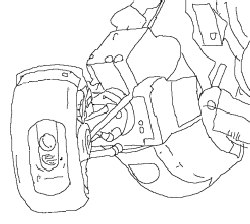What is evil? Peter Dews says it’s an idea we’re not comfortable with any more; after the shock of Nazism, Hannah Arendt thought we’d spend the rest of the century talking about it; but actually very little was said. We are inclined to talk about conspicuous badness as something that has somehow been wired into some people’s nature; but if it’s wired in, they had no choice and it can’t be really evil…
Simon Baron-Cohen rests on the idea that often what we’re really dealing with is a failure of empathy and explains some of the ways modern research is showing it can fall short through genetics or other issues. Dews raises a good objection; that moral goodness and empathy are clearly distinct. Your empathy with your wife might give you the knowledge you need to be really hurtful, for example. Baron-Cohen has an answer to this particular example in his distinction between cognitive and affective empathy – it’s one thing to understand another person’s feelings and quite another to share them or care about them. But surely there are other ways empathy isn’t quite right? Empathy with wicked people might cause us to help them in their wrong-doing, mightn’t it? Lack of empathy might allow you to be a good dentist…
Rebecca Roache thinks evil is a fuzzy concept but one that is entwined in our moral discourse and one we should be poorer for abandoning. Describing the Holocaust as ‘very bad’ wouldn’t really do the job.
In my own view, to be evil requires that you understand right and wrong, and choose wrong. This seems impossible, because according to Socrates, anyone who really understands what good is, must want to do it. It has never looked like that in real life, however, where there seem to be plenty of people doing things they know are wrong
Luckily I recently set out in a nutshell the complete and final theory of ethics. In even briefer form: I think we seek to act effectively out of a kind of roughly existentialist self-assertion. We see that general aims serve our purpose better than limited ones and so choose to act categorically on roughly Kantian reasoning. A sort of empty consequentialism provides us with a calculus by which to choose the generally effective over the particular, but unfortunately the values are often impossible to assess in practice. We therefore fall back on moral codes, set of rules we know are likely to give the best results in the long run.
Now, that suggests Socrates was broadly right; doing the right thing just makes sense. But the system is complicated; there are actually several different principles at work at different levels, and this does give rise to real conflicts.
At the lower levels, these conflicts can give rise to the appearance of evil. Different people may, for example, quite properly have slightly different moral codes that either legitimately reflect cultural difference or are matters of mere convention. Irritable people may see the pursuit of a different code from their own as automatically evil. Second, there’s a genuine tension between any code and the consequentialist rationale that supports it. We follow the code because we can’t do the calculus, but every now and then, as in the case of white lies, the utility of breaking the code is practically obvious. People who cling to the code, or people who treat it as flexible, may be seen as evil by those who make different judgements. In fact all these conflicts can be internalised and lead to feelings of guilt and moral doubt; we may even feel a bit bad ourselves.
None of those examples really deserve to be called evil in my view though; that label only applies to higher level problems. The whole thing starts with self-assertion, and some may feel that deliberate wickedness allows them to make a bigger splash. Sure, they may say, I understand that my wrongdoing harms society and thereby indirectly harms my own consequential legacy. But I reckon people will sort of carry things for me; meanwhile I’ll write my name on history far more effectively as a master of wickedness than as a useful clerk. This is a mistake, undoubtedly, but unfortunately the virtuous arguments are rather subtle and unexciting, whereas the false reasoning is Byronic and attractive. I reckon that’s how the deliberate choice of recognised evil sometimes arises.

 Why are we evil? This
Why are we evil? This 